Business Ethics Report: Monsanto's Ethical Culture and GM Seeds
VerifiedAdded on 2020/10/05
|11
|3815
|100
Report
AI Summary
This report provides a comprehensive analysis of Monsanto's business ethics, focusing on its ethical culture and its response to various stakeholders, including employees, government, shareholders, investors, and farmers. The report examines the benefits and negative consequences of growing genetically modified (GM) seeds for crops, with a particular emphasis on the environmental concerns associated with products like Round-up. It delves into Monsanto's ethical challenges and opportunities, highlighting instances of unethical practices and the potential harm to human, plant, and animal life. The analysis assesses Monsanto's stakeholder management, the impact of its products, and the company's efforts to maintain an ethical culture. Furthermore, the report provides a comparison of the advantages and disadvantages of GM seeds, considering factors such as increased food production versus environmental and health impacts. It also explores alternative approaches Monsanto could adopt to minimize negative consequences and improve its ethical standing, including the use of GM food with the least side effects and the investigation of modifications to GM food to reduce harm. The report uses a 7-step model to analyze the case effectively, and it also considers utilitarian principles, justice, and right principles to evaluate the ethical considerations related to Monsanto's actions and their impact on stakeholders.
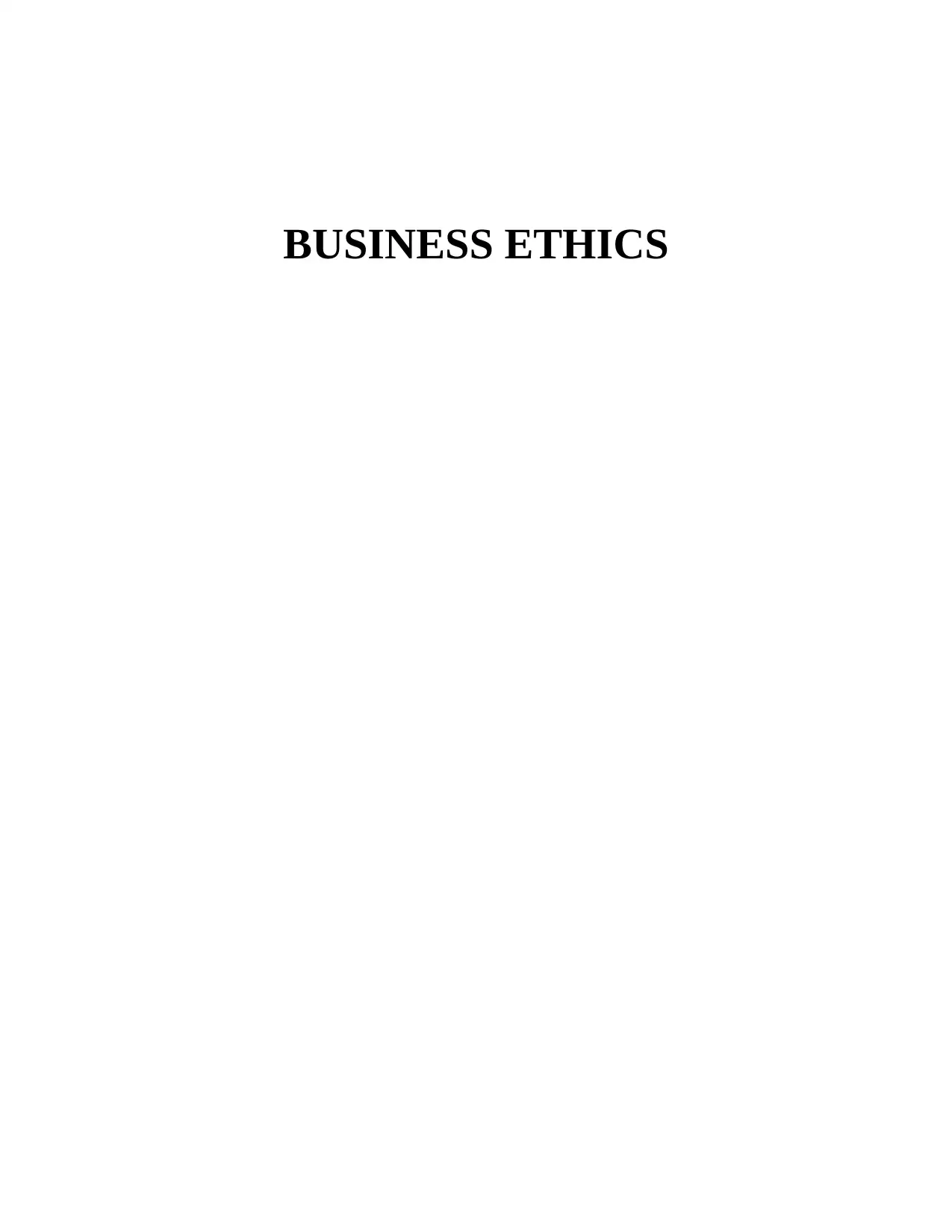
BUSINESS ETHICS
Paraphrase This Document
Need a fresh take? Get an instant paraphrase of this document with our AI Paraphraser
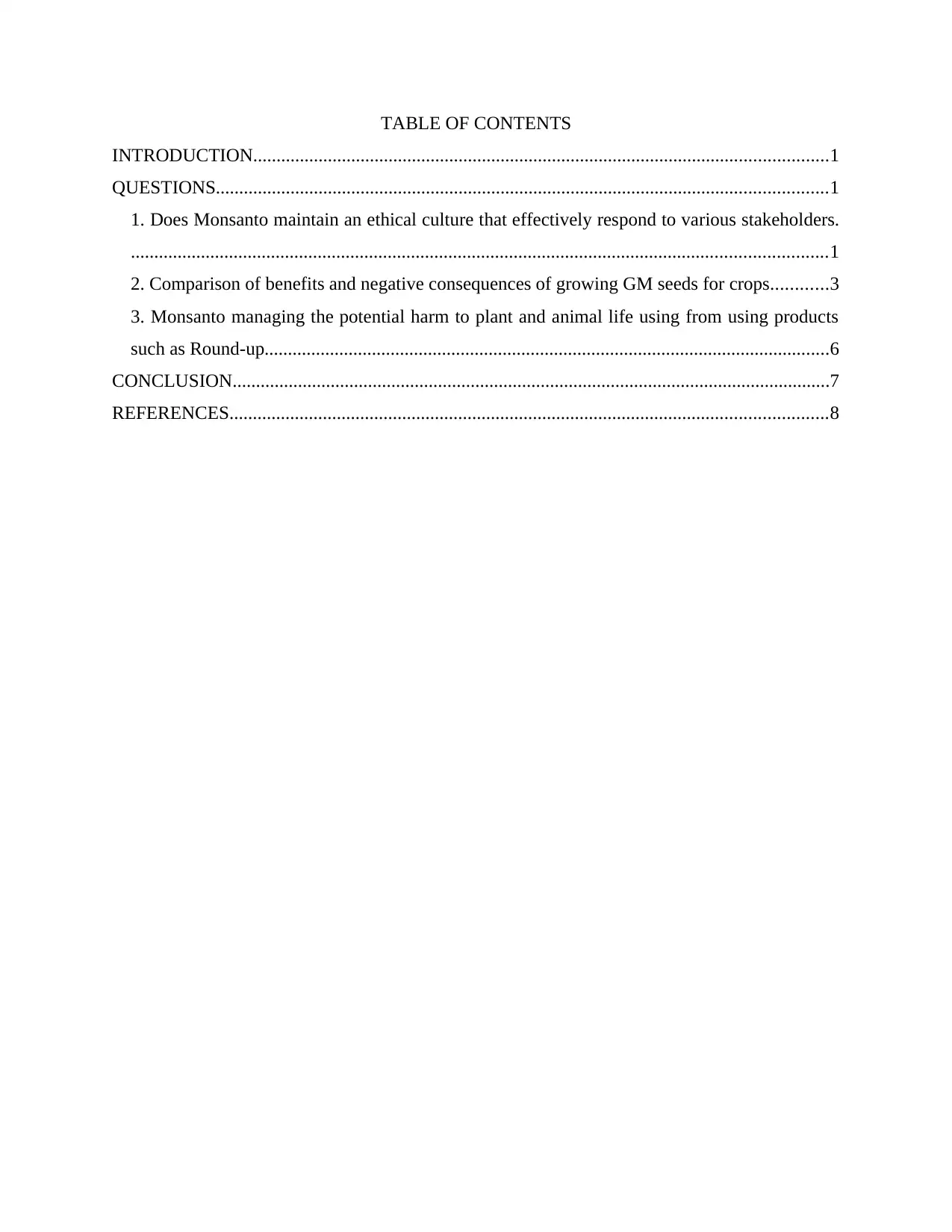
TABLE OF CONTENTS
INTRODUCTION...........................................................................................................................1
QUESTIONS...................................................................................................................................1
1. Does Monsanto maintain an ethical culture that effectively respond to various stakeholders.
.....................................................................................................................................................1
2. Comparison of benefits and negative consequences of growing GM seeds for crops............3
3. Monsanto managing the potential harm to plant and animal life using from using products
such as Round-up.........................................................................................................................6
CONCLUSION................................................................................................................................7
REFERENCES................................................................................................................................8
INTRODUCTION...........................................................................................................................1
QUESTIONS...................................................................................................................................1
1. Does Monsanto maintain an ethical culture that effectively respond to various stakeholders.
.....................................................................................................................................................1
2. Comparison of benefits and negative consequences of growing GM seeds for crops............3
3. Monsanto managing the potential harm to plant and animal life using from using products
such as Round-up.........................................................................................................................6
CONCLUSION................................................................................................................................7
REFERENCES................................................................................................................................8
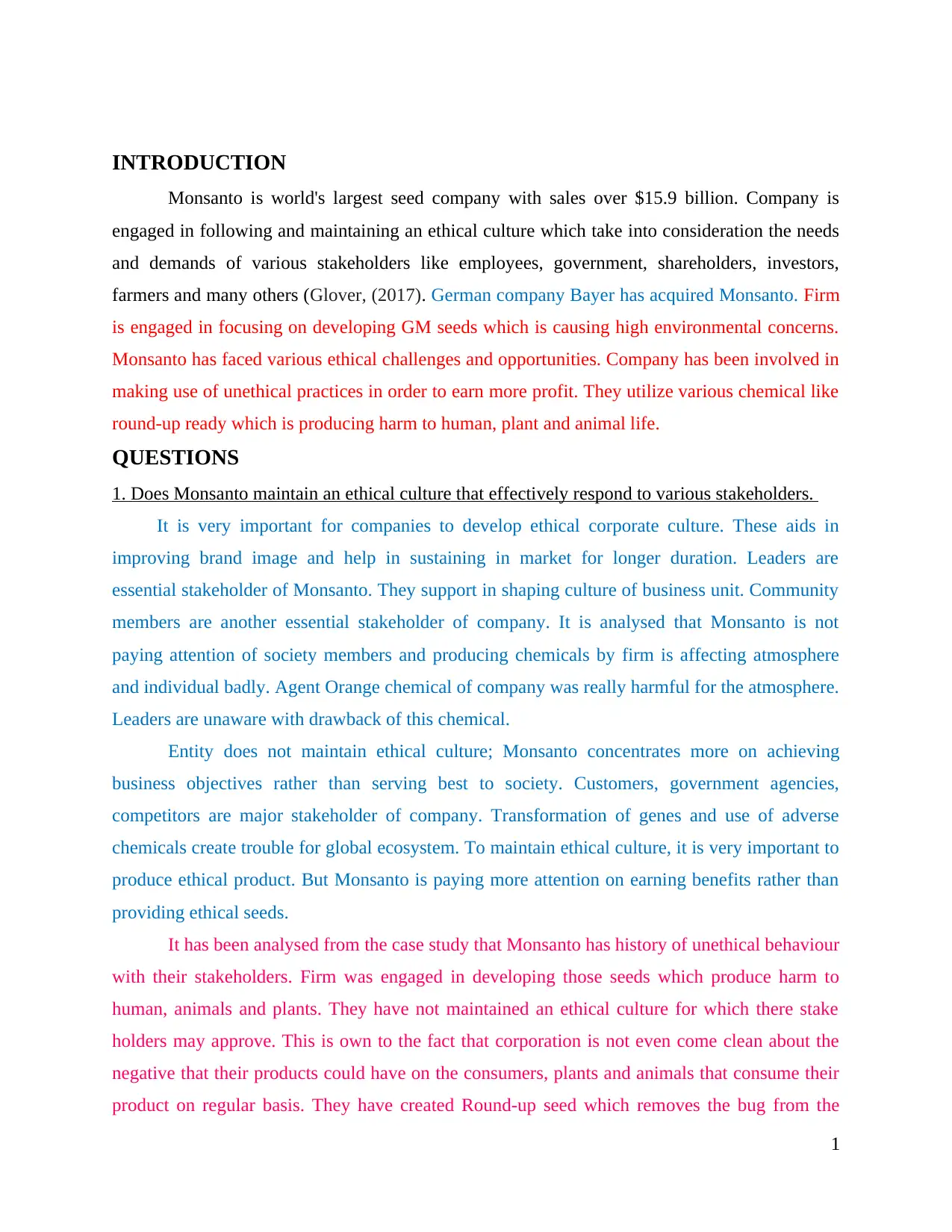
INTRODUCTION
Monsanto is world's largest seed company with sales over $15.9 billion. Company is
engaged in following and maintaining an ethical culture which take into consideration the needs
and demands of various stakeholders like employees, government, shareholders, investors,
farmers and many others (Glover, (2017). German company Bayer has acquired Monsanto. Firm
is engaged in focusing on developing GM seeds which is causing high environmental concerns.
Monsanto has faced various ethical challenges and opportunities. Company has been involved in
making use of unethical practices in order to earn more profit. They utilize various chemical like
round-up ready which is producing harm to human, plant and animal life.
QUESTIONS
1. Does Monsanto maintain an ethical culture that effectively respond to various stakeholders.
It is very important for companies to develop ethical corporate culture. These aids in
improving brand image and help in sustaining in market for longer duration. Leaders are
essential stakeholder of Monsanto. They support in shaping culture of business unit. Community
members are another essential stakeholder of company. It is analysed that Monsanto is not
paying attention of society members and producing chemicals by firm is affecting atmosphere
and individual badly. Agent Orange chemical of company was really harmful for the atmosphere.
Leaders are unaware with drawback of this chemical.
Entity does not maintain ethical culture; Monsanto concentrates more on achieving
business objectives rather than serving best to society. Customers, government agencies,
competitors are major stakeholder of company. Transformation of genes and use of adverse
chemicals create trouble for global ecosystem. To maintain ethical culture, it is very important to
produce ethical product. But Monsanto is paying more attention on earning benefits rather than
providing ethical seeds.
It has been analysed from the case study that Monsanto has history of unethical behaviour
with their stakeholders. Firm was engaged in developing those seeds which produce harm to
human, animals and plants. They have not maintained an ethical culture for which there stake
holders may approve. This is own to the fact that corporation is not even come clean about the
negative that their products could have on the consumers, plants and animals that consume their
product on regular basis. They have created Round-up seed which removes the bug from the
1
Monsanto is world's largest seed company with sales over $15.9 billion. Company is
engaged in following and maintaining an ethical culture which take into consideration the needs
and demands of various stakeholders like employees, government, shareholders, investors,
farmers and many others (Glover, (2017). German company Bayer has acquired Monsanto. Firm
is engaged in focusing on developing GM seeds which is causing high environmental concerns.
Monsanto has faced various ethical challenges and opportunities. Company has been involved in
making use of unethical practices in order to earn more profit. They utilize various chemical like
round-up ready which is producing harm to human, plant and animal life.
QUESTIONS
1. Does Monsanto maintain an ethical culture that effectively respond to various stakeholders.
It is very important for companies to develop ethical corporate culture. These aids in
improving brand image and help in sustaining in market for longer duration. Leaders are
essential stakeholder of Monsanto. They support in shaping culture of business unit. Community
members are another essential stakeholder of company. It is analysed that Monsanto is not
paying attention of society members and producing chemicals by firm is affecting atmosphere
and individual badly. Agent Orange chemical of company was really harmful for the atmosphere.
Leaders are unaware with drawback of this chemical.
Entity does not maintain ethical culture; Monsanto concentrates more on achieving
business objectives rather than serving best to society. Customers, government agencies,
competitors are major stakeholder of company. Transformation of genes and use of adverse
chemicals create trouble for global ecosystem. To maintain ethical culture, it is very important to
produce ethical product. But Monsanto is paying more attention on earning benefits rather than
providing ethical seeds.
It has been analysed from the case study that Monsanto has history of unethical behaviour
with their stakeholders. Firm was engaged in developing those seeds which produce harm to
human, animals and plants. They have not maintained an ethical culture for which there stake
holders may approve. This is own to the fact that corporation is not even come clean about the
negative that their products could have on the consumers, plants and animals that consume their
product on regular basis. They have created Round-up seed which removes the bug from the
1
⊘ This is a preview!⊘
Do you want full access?
Subscribe today to unlock all pages.

Trusted by 1+ million students worldwide
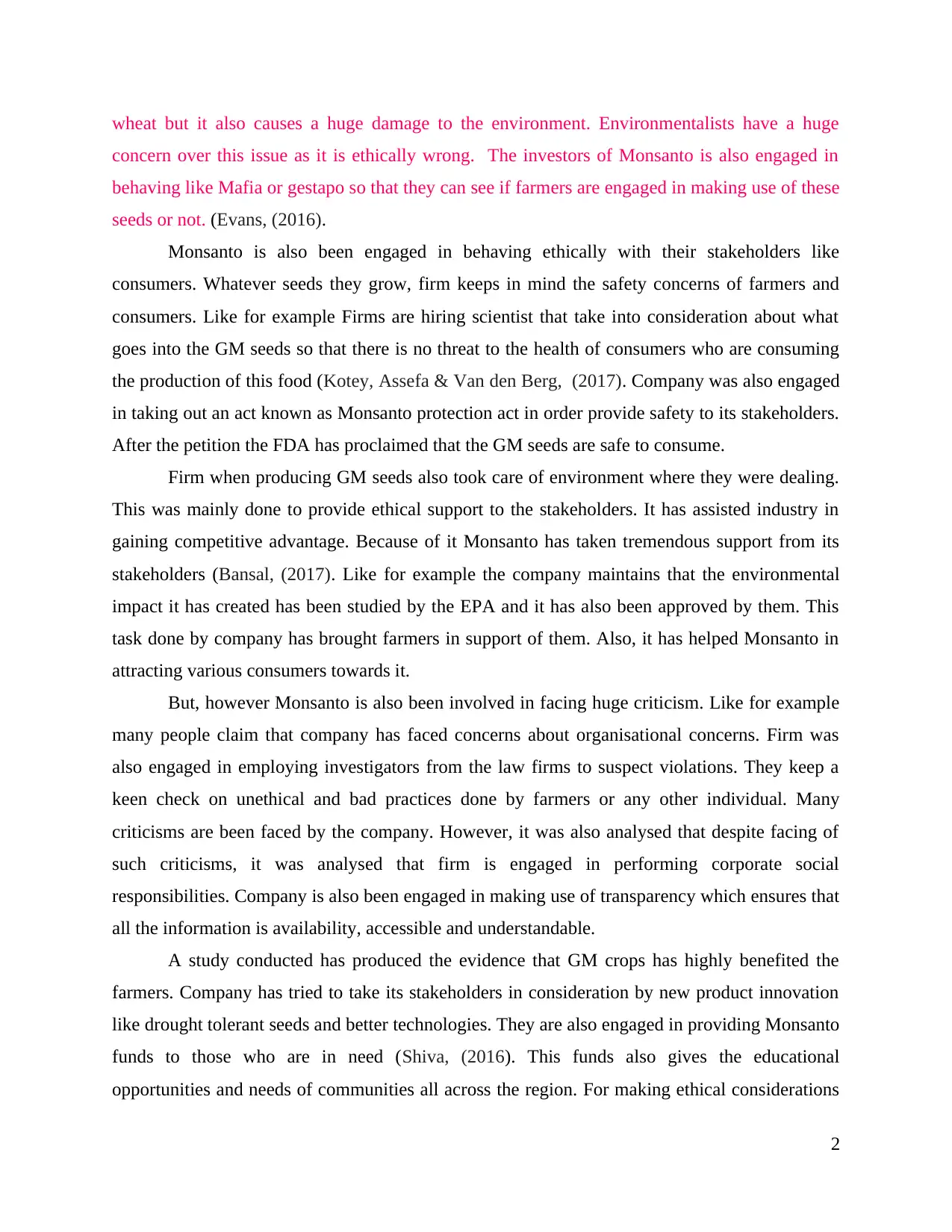
wheat but it also causes a huge damage to the environment. Environmentalists have a huge
concern over this issue as it is ethically wrong. The investors of Monsanto is also engaged in
behaving like Mafia or gestapo so that they can see if farmers are engaged in making use of these
seeds or not. (Evans, (2016).
Monsanto is also been engaged in behaving ethically with their stakeholders like
consumers. Whatever seeds they grow, firm keeps in mind the safety concerns of farmers and
consumers. Like for example Firms are hiring scientist that take into consideration about what
goes into the GM seeds so that there is no threat to the health of consumers who are consuming
the production of this food (Kotey, Assefa & Van den Berg, (2017). Company was also engaged
in taking out an act known as Monsanto protection act in order provide safety to its stakeholders.
After the petition the FDA has proclaimed that the GM seeds are safe to consume.
Firm when producing GM seeds also took care of environment where they were dealing.
This was mainly done to provide ethical support to the stakeholders. It has assisted industry in
gaining competitive advantage. Because of it Monsanto has taken tremendous support from its
stakeholders (Bansal, (2017). Like for example the company maintains that the environmental
impact it has created has been studied by the EPA and it has also been approved by them. This
task done by company has brought farmers in support of them. Also, it has helped Monsanto in
attracting various consumers towards it.
But, however Monsanto is also been involved in facing huge criticism. Like for example
many people claim that company has faced concerns about organisational concerns. Firm was
also engaged in employing investigators from the law firms to suspect violations. They keep a
keen check on unethical and bad practices done by farmers or any other individual. Many
criticisms are been faced by the company. However, it was also analysed that despite facing of
such criticisms, it was analysed that firm is engaged in performing corporate social
responsibilities. Company is also been engaged in making use of transparency which ensures that
all the information is availability, accessible and understandable.
A study conducted has produced the evidence that GM crops has highly benefited the
farmers. Company has tried to take its stakeholders in consideration by new product innovation
like drought tolerant seeds and better technologies. They are also engaged in providing Monsanto
funds to those who are in need (Shiva, (2016). This funds also gives the educational
opportunities and needs of communities all across the region. For making ethical considerations
2
concern over this issue as it is ethically wrong. The investors of Monsanto is also engaged in
behaving like Mafia or gestapo so that they can see if farmers are engaged in making use of these
seeds or not. (Evans, (2016).
Monsanto is also been engaged in behaving ethically with their stakeholders like
consumers. Whatever seeds they grow, firm keeps in mind the safety concerns of farmers and
consumers. Like for example Firms are hiring scientist that take into consideration about what
goes into the GM seeds so that there is no threat to the health of consumers who are consuming
the production of this food (Kotey, Assefa & Van den Berg, (2017). Company was also engaged
in taking out an act known as Monsanto protection act in order provide safety to its stakeholders.
After the petition the FDA has proclaimed that the GM seeds are safe to consume.
Firm when producing GM seeds also took care of environment where they were dealing.
This was mainly done to provide ethical support to the stakeholders. It has assisted industry in
gaining competitive advantage. Because of it Monsanto has taken tremendous support from its
stakeholders (Bansal, (2017). Like for example the company maintains that the environmental
impact it has created has been studied by the EPA and it has also been approved by them. This
task done by company has brought farmers in support of them. Also, it has helped Monsanto in
attracting various consumers towards it.
But, however Monsanto is also been involved in facing huge criticism. Like for example
many people claim that company has faced concerns about organisational concerns. Firm was
also engaged in employing investigators from the law firms to suspect violations. They keep a
keen check on unethical and bad practices done by farmers or any other individual. Many
criticisms are been faced by the company. However, it was also analysed that despite facing of
such criticisms, it was analysed that firm is engaged in performing corporate social
responsibilities. Company is also been engaged in making use of transparency which ensures that
all the information is availability, accessible and understandable.
A study conducted has produced the evidence that GM crops has highly benefited the
farmers. Company has tried to take its stakeholders in consideration by new product innovation
like drought tolerant seeds and better technologies. They are also engaged in providing Monsanto
funds to those who are in need (Shiva, (2016). This funds also gives the educational
opportunities and needs of communities all across the region. For making ethical considerations
2
Paraphrase This Document
Need a fresh take? Get an instant paraphrase of this document with our AI Paraphraser
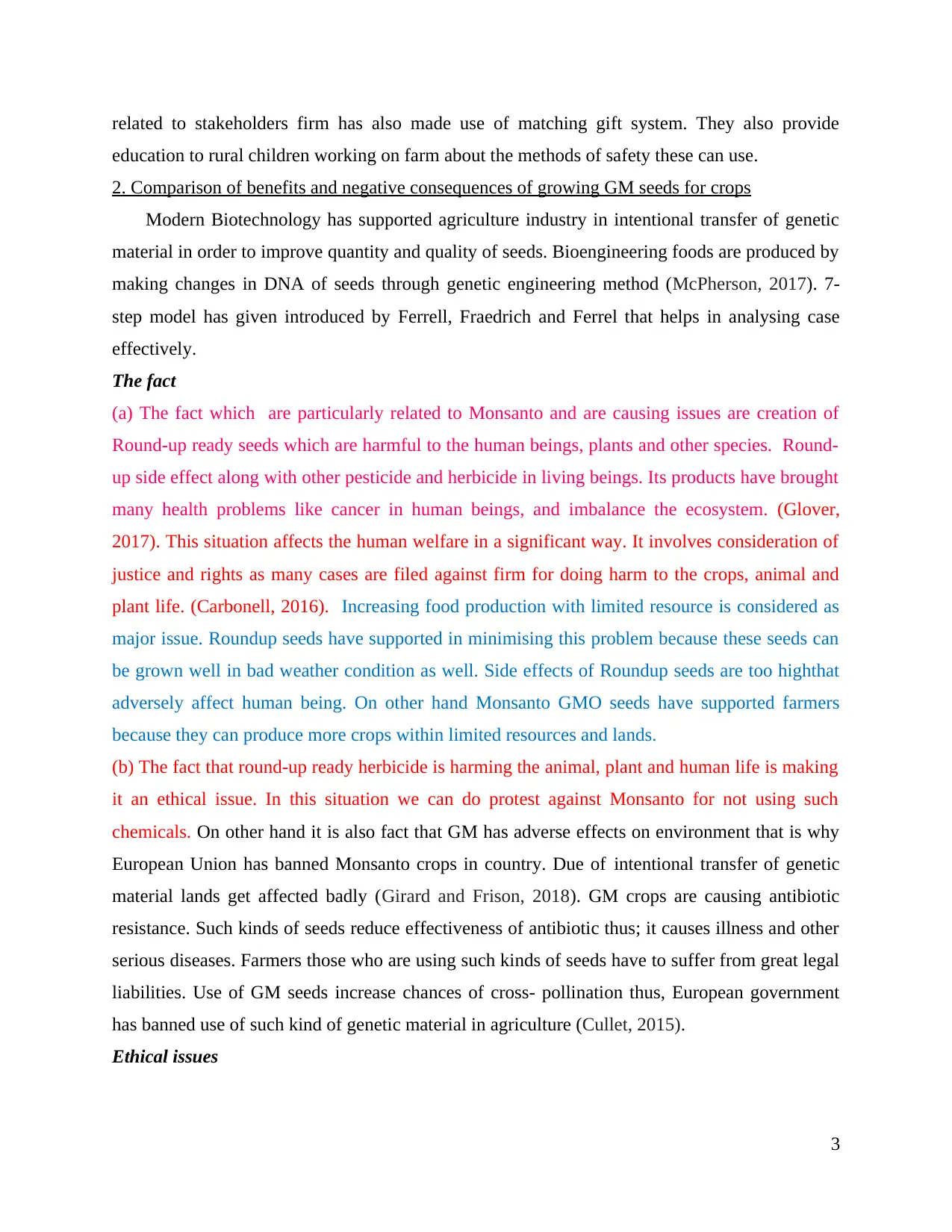
related to stakeholders firm has also made use of matching gift system. They also provide
education to rural children working on farm about the methods of safety these can use.
2. Comparison of benefits and negative consequences of growing GM seeds for crops
Modern Biotechnology has supported agriculture industry in intentional transfer of genetic
material in order to improve quantity and quality of seeds. Bioengineering foods are produced by
making changes in DNA of seeds through genetic engineering method (McPherson, 2017). 7-
step model has given introduced by Ferrell, Fraedrich and Ferrel that helps in analysing case
effectively.
The fact
(a) The fact which are particularly related to Monsanto and are causing issues are creation of
Round-up ready seeds which are harmful to the human beings, plants and other species. Round-
up side effect along with other pesticide and herbicide in living beings. Its products have brought
many health problems like cancer in human beings, and imbalance the ecosystem. (Glover,
2017). This situation affects the human welfare in a significant way. It involves consideration of
justice and rights as many cases are filed against firm for doing harm to the crops, animal and
plant life. (Carbonell, 2016). Increasing food production with limited resource is considered as
major issue. Roundup seeds have supported in minimising this problem because these seeds can
be grown well in bad weather condition as well. Side effects of Roundup seeds are too highthat
adversely affect human being. On other hand Monsanto GMO seeds have supported farmers
because they can produce more crops within limited resources and lands.
(b) The fact that round-up ready herbicide is harming the animal, plant and human life is making
it an ethical issue. In this situation we can do protest against Monsanto for not using such
chemicals. On other hand it is also fact that GM has adverse effects on environment that is why
European Union has banned Monsanto crops in country. Due of intentional transfer of genetic
material lands get affected badly (Girard and Frison, 2018). GM crops are causing antibiotic
resistance. Such kinds of seeds reduce effectiveness of antibiotic thus; it causes illness and other
serious diseases. Farmers those who are using such kinds of seeds have to suffer from great legal
liabilities. Use of GM seeds increase chances of cross- pollination thus, European government
has banned use of such kind of genetic material in agriculture (Cullet, 2015).
Ethical issues
3
education to rural children working on farm about the methods of safety these can use.
2. Comparison of benefits and negative consequences of growing GM seeds for crops
Modern Biotechnology has supported agriculture industry in intentional transfer of genetic
material in order to improve quantity and quality of seeds. Bioengineering foods are produced by
making changes in DNA of seeds through genetic engineering method (McPherson, 2017). 7-
step model has given introduced by Ferrell, Fraedrich and Ferrel that helps in analysing case
effectively.
The fact
(a) The fact which are particularly related to Monsanto and are causing issues are creation of
Round-up ready seeds which are harmful to the human beings, plants and other species. Round-
up side effect along with other pesticide and herbicide in living beings. Its products have brought
many health problems like cancer in human beings, and imbalance the ecosystem. (Glover,
2017). This situation affects the human welfare in a significant way. It involves consideration of
justice and rights as many cases are filed against firm for doing harm to the crops, animal and
plant life. (Carbonell, 2016). Increasing food production with limited resource is considered as
major issue. Roundup seeds have supported in minimising this problem because these seeds can
be grown well in bad weather condition as well. Side effects of Roundup seeds are too highthat
adversely affect human being. On other hand Monsanto GMO seeds have supported farmers
because they can produce more crops within limited resources and lands.
(b) The fact that round-up ready herbicide is harming the animal, plant and human life is making
it an ethical issue. In this situation we can do protest against Monsanto for not using such
chemicals. On other hand it is also fact that GM has adverse effects on environment that is why
European Union has banned Monsanto crops in country. Due of intentional transfer of genetic
material lands get affected badly (Girard and Frison, 2018). GM crops are causing antibiotic
resistance. Such kinds of seeds reduce effectiveness of antibiotic thus; it causes illness and other
serious diseases. Farmers those who are using such kinds of seeds have to suffer from great legal
liabilities. Use of GM seeds increase chances of cross- pollination thus, European government
has banned use of such kind of genetic material in agriculture (Cullet, 2015).
Ethical issues
3
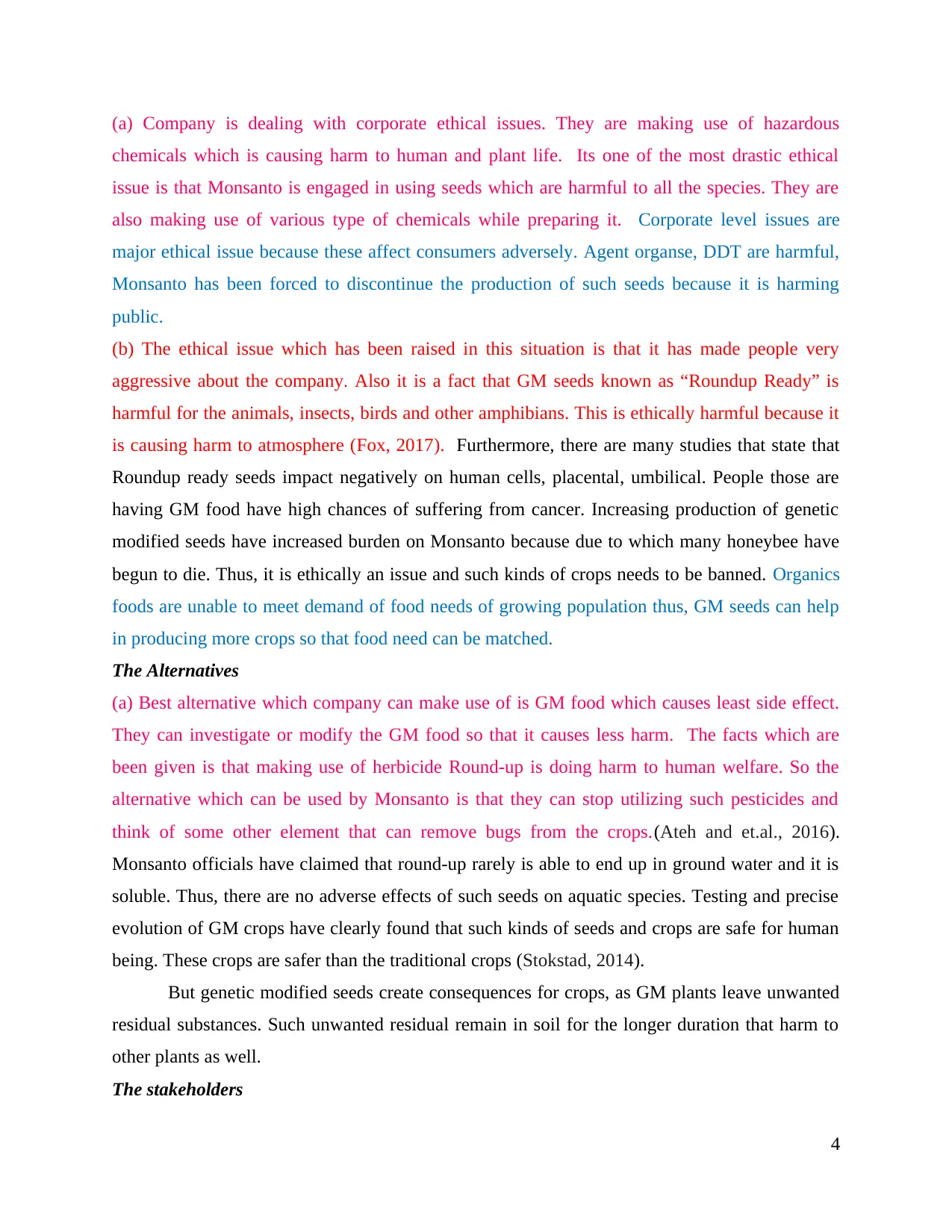
(a) Company is dealing with corporate ethical issues. They are making use of hazardous
chemicals which is causing harm to human and plant life. Its one of the most drastic ethical
issue is that Monsanto is engaged in using seeds which are harmful to all the species. They are
also making use of various type of chemicals while preparing it. Corporate level issues are
major ethical issue because these affect consumers adversely. Agent organse, DDT are harmful,
Monsanto has been forced to discontinue the production of such seeds because it is harming
public.
(b) The ethical issue which has been raised in this situation is that it has made people very
aggressive about the company. Also it is a fact that GM seeds known as “Roundup Ready” is
harmful for the animals, insects, birds and other amphibians. This is ethically harmful because it
is causing harm to atmosphere (Fox, 2017). Furthermore, there are many studies that state that
Roundup ready seeds impact negatively on human cells, placental, umbilical. People those are
having GM food have high chances of suffering from cancer. Increasing production of genetic
modified seeds have increased burden on Monsanto because due to which many honeybee have
begun to die. Thus, it is ethically an issue and such kinds of crops needs to be banned. Organics
foods are unable to meet demand of food needs of growing population thus, GM seeds can help
in producing more crops so that food need can be matched.
The Alternatives
(a) Best alternative which company can make use of is GM food which causes least side effect.
They can investigate or modify the GM food so that it causes less harm. The facts which are
been given is that making use of herbicide Round-up is doing harm to human welfare. So the
alternative which can be used by Monsanto is that they can stop utilizing such pesticides and
think of some other element that can remove bugs from the crops.(Ateh and et.al., 2016).
Monsanto officials have claimed that round-up rarely is able to end up in ground water and it is
soluble. Thus, there are no adverse effects of such seeds on aquatic species. Testing and precise
evolution of GM crops have clearly found that such kinds of seeds and crops are safe for human
being. These crops are safer than the traditional crops (Stokstad, 2014).
But genetic modified seeds create consequences for crops, as GM plants leave unwanted
residual substances. Such unwanted residual remain in soil for the longer duration that harm to
other plants as well.
The stakeholders
4
chemicals which is causing harm to human and plant life. Its one of the most drastic ethical
issue is that Monsanto is engaged in using seeds which are harmful to all the species. They are
also making use of various type of chemicals while preparing it. Corporate level issues are
major ethical issue because these affect consumers adversely. Agent organse, DDT are harmful,
Monsanto has been forced to discontinue the production of such seeds because it is harming
public.
(b) The ethical issue which has been raised in this situation is that it has made people very
aggressive about the company. Also it is a fact that GM seeds known as “Roundup Ready” is
harmful for the animals, insects, birds and other amphibians. This is ethically harmful because it
is causing harm to atmosphere (Fox, 2017). Furthermore, there are many studies that state that
Roundup ready seeds impact negatively on human cells, placental, umbilical. People those are
having GM food have high chances of suffering from cancer. Increasing production of genetic
modified seeds have increased burden on Monsanto because due to which many honeybee have
begun to die. Thus, it is ethically an issue and such kinds of crops needs to be banned. Organics
foods are unable to meet demand of food needs of growing population thus, GM seeds can help
in producing more crops so that food need can be matched.
The Alternatives
(a) Best alternative which company can make use of is GM food which causes least side effect.
They can investigate or modify the GM food so that it causes less harm. The facts which are
been given is that making use of herbicide Round-up is doing harm to human welfare. So the
alternative which can be used by Monsanto is that they can stop utilizing such pesticides and
think of some other element that can remove bugs from the crops.(Ateh and et.al., 2016).
Monsanto officials have claimed that round-up rarely is able to end up in ground water and it is
soluble. Thus, there are no adverse effects of such seeds on aquatic species. Testing and precise
evolution of GM crops have clearly found that such kinds of seeds and crops are safe for human
being. These crops are safer than the traditional crops (Stokstad, 2014).
But genetic modified seeds create consequences for crops, as GM plants leave unwanted
residual substances. Such unwanted residual remain in soil for the longer duration that harm to
other plants as well.
The stakeholders
4
⊘ This is a preview!⊘
Do you want full access?
Subscribe today to unlock all pages.

Trusted by 1+ million students worldwide
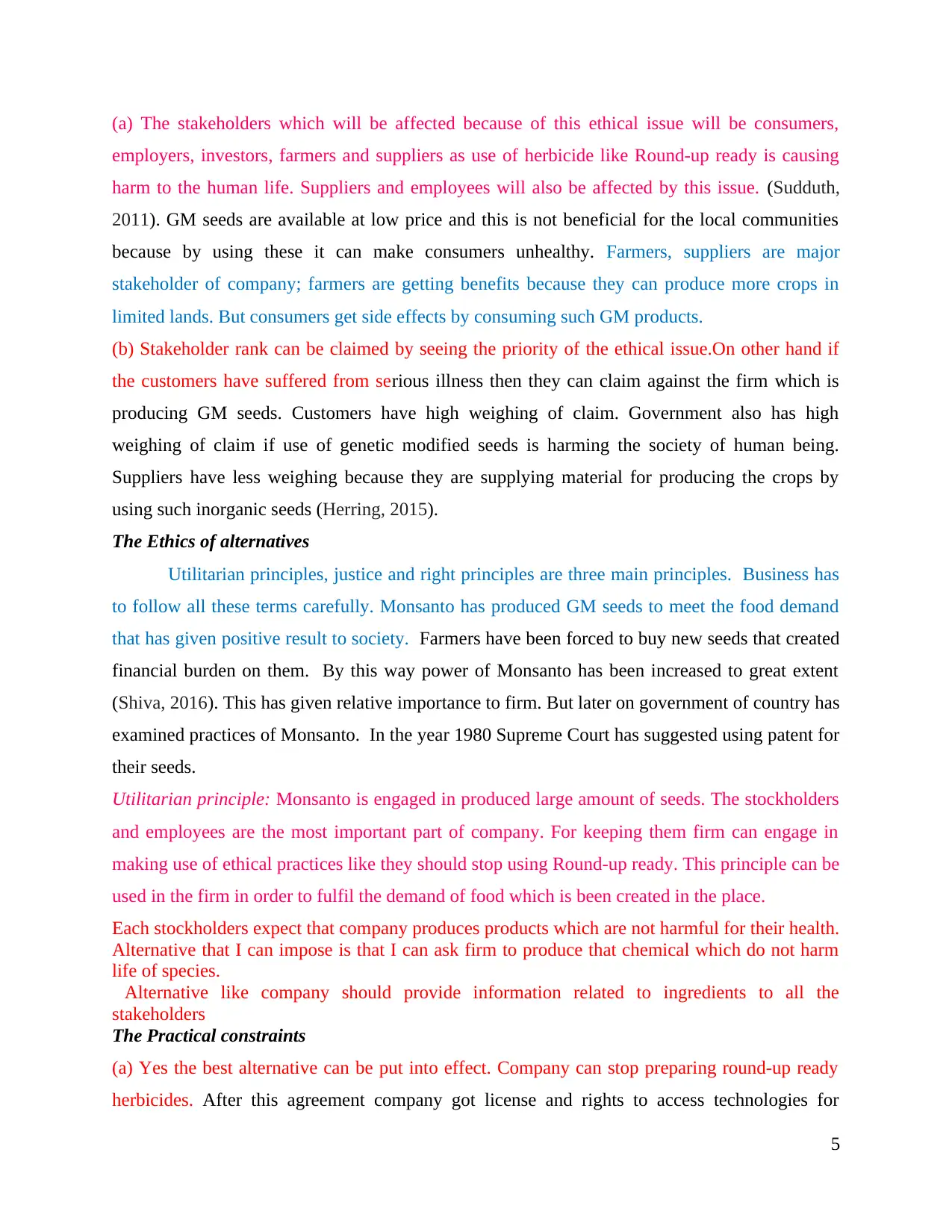
(a) The stakeholders which will be affected because of this ethical issue will be consumers,
employers, investors, farmers and suppliers as use of herbicide like Round-up ready is causing
harm to the human life. Suppliers and employees will also be affected by this issue. (Sudduth,
2011). GM seeds are available at low price and this is not beneficial for the local communities
because by using these it can make consumers unhealthy. Farmers, suppliers are major
stakeholder of company; farmers are getting benefits because they can produce more crops in
limited lands. But consumers get side effects by consuming such GM products.
(b) Stakeholder rank can be claimed by seeing the priority of the ethical issue.On other hand if
the customers have suffered from serious illness then they can claim against the firm which is
producing GM seeds. Customers have high weighing of claim. Government also has high
weighing of claim if use of genetic modified seeds is harming the society of human being.
Suppliers have less weighing because they are supplying material for producing the crops by
using such inorganic seeds (Herring, 2015).
The Ethics of alternatives
Utilitarian principles, justice and right principles are three main principles. Business has
to follow all these terms carefully. Monsanto has produced GM seeds to meet the food demand
that has given positive result to society. Farmers have been forced to buy new seeds that created
financial burden on them. By this way power of Monsanto has been increased to great extent
(Shiva, 2016). This has given relative importance to firm. But later on government of country has
examined practices of Monsanto. In the year 1980 Supreme Court has suggested using patent for
their seeds.
Utilitarian principle: Monsanto is engaged in produced large amount of seeds. The stockholders
and employees are the most important part of company. For keeping them firm can engage in
making use of ethical practices like they should stop using Round-up ready. This principle can be
used in the firm in order to fulfil the demand of food which is been created in the place.
Each stockholders expect that company produces products which are not harmful for their health.
Alternative that I can impose is that I can ask firm to produce that chemical which do not harm
life of species.
Alternative like company should provide information related to ingredients to all the
stakeholders
The Practical constraints
(a) Yes the best alternative can be put into effect. Company can stop preparing round-up ready
herbicides. After this agreement company got license and rights to access technologies for
5
employers, investors, farmers and suppliers as use of herbicide like Round-up ready is causing
harm to the human life. Suppliers and employees will also be affected by this issue. (Sudduth,
2011). GM seeds are available at low price and this is not beneficial for the local communities
because by using these it can make consumers unhealthy. Farmers, suppliers are major
stakeholder of company; farmers are getting benefits because they can produce more crops in
limited lands. But consumers get side effects by consuming such GM products.
(b) Stakeholder rank can be claimed by seeing the priority of the ethical issue.On other hand if
the customers have suffered from serious illness then they can claim against the firm which is
producing GM seeds. Customers have high weighing of claim. Government also has high
weighing of claim if use of genetic modified seeds is harming the society of human being.
Suppliers have less weighing because they are supplying material for producing the crops by
using such inorganic seeds (Herring, 2015).
The Ethics of alternatives
Utilitarian principles, justice and right principles are three main principles. Business has
to follow all these terms carefully. Monsanto has produced GM seeds to meet the food demand
that has given positive result to society. Farmers have been forced to buy new seeds that created
financial burden on them. By this way power of Monsanto has been increased to great extent
(Shiva, 2016). This has given relative importance to firm. But later on government of country has
examined practices of Monsanto. In the year 1980 Supreme Court has suggested using patent for
their seeds.
Utilitarian principle: Monsanto is engaged in produced large amount of seeds. The stockholders
and employees are the most important part of company. For keeping them firm can engage in
making use of ethical practices like they should stop using Round-up ready. This principle can be
used in the firm in order to fulfil the demand of food which is been created in the place.
Each stockholders expect that company produces products which are not harmful for their health.
Alternative that I can impose is that I can ask firm to produce that chemical which do not harm
life of species.
Alternative like company should provide information related to ingredients to all the
stakeholders
The Practical constraints
(a) Yes the best alternative can be put into effect. Company can stop preparing round-up ready
herbicides. After this agreement company got license and rights to access technologies for
5
Paraphrase This Document
Need a fresh take? Get an instant paraphrase of this document with our AI Paraphraser
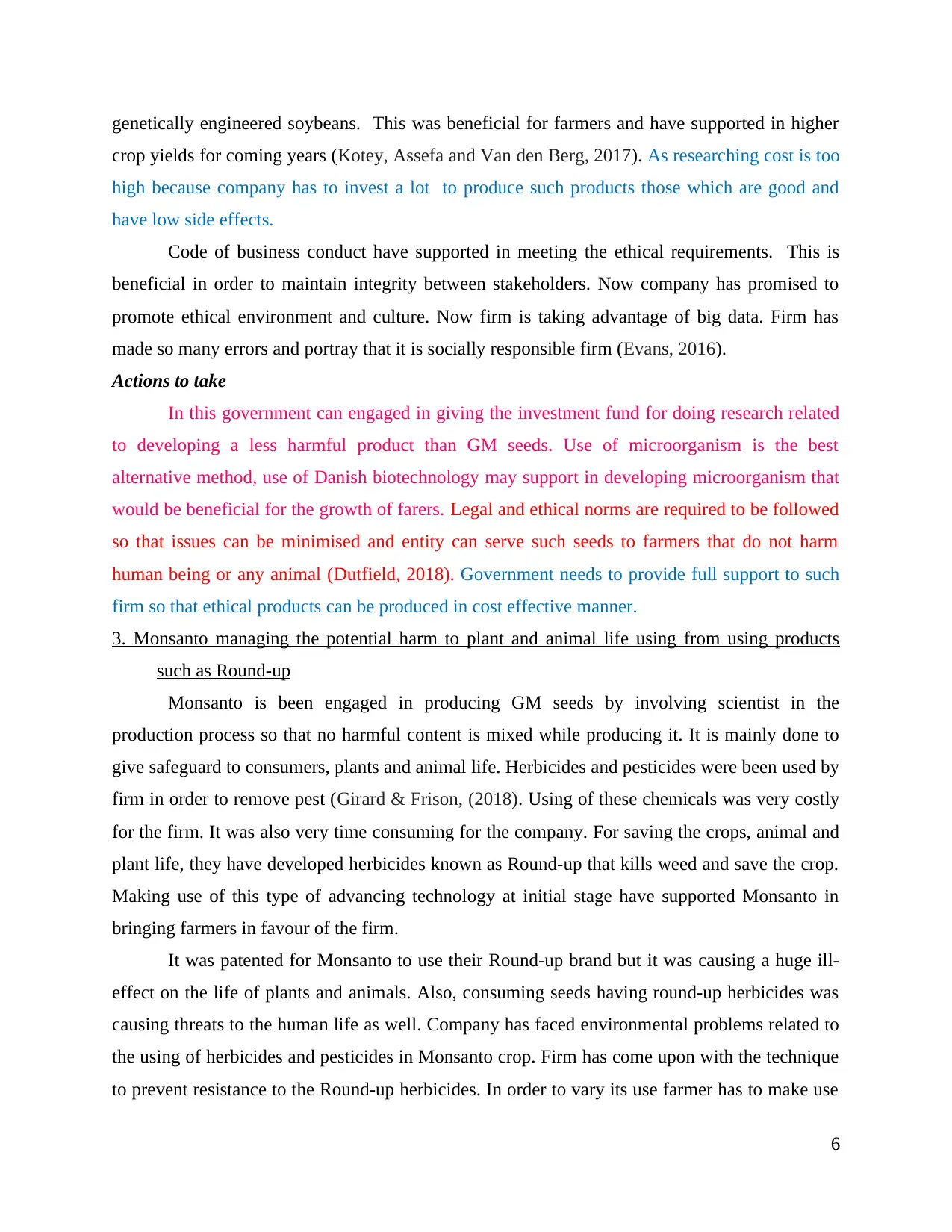
genetically engineered soybeans. This was beneficial for farmers and have supported in higher
crop yields for coming years (Kotey, Assefa and Van den Berg, 2017). As researching cost is too
high because company has to invest a lot to produce such products those which are good and
have low side effects.
Code of business conduct have supported in meeting the ethical requirements. This is
beneficial in order to maintain integrity between stakeholders. Now company has promised to
promote ethical environment and culture. Now firm is taking advantage of big data. Firm has
made so many errors and portray that it is socially responsible firm (Evans, 2016).
Actions to take
In this government can engaged in giving the investment fund for doing research related
to developing a less harmful product than GM seeds. Use of microorganism is the best
alternative method, use of Danish biotechnology may support in developing microorganism that
would be beneficial for the growth of farers. Legal and ethical norms are required to be followed
so that issues can be minimised and entity can serve such seeds to farmers that do not harm
human being or any animal (Dutfield, 2018). Government needs to provide full support to such
firm so that ethical products can be produced in cost effective manner.
3. Monsanto managing the potential harm to plant and animal life using from using products
such as Round-up
Monsanto is been engaged in producing GM seeds by involving scientist in the
production process so that no harmful content is mixed while producing it. It is mainly done to
give safeguard to consumers, plants and animal life. Herbicides and pesticides were been used by
firm in order to remove pest (Girard & Frison, (2018). Using of these chemicals was very costly
for the firm. It was also very time consuming for the company. For saving the crops, animal and
plant life, they have developed herbicides known as Round-up that kills weed and save the crop.
Making use of this type of advancing technology at initial stage have supported Monsanto in
bringing farmers in favour of the firm.
It was patented for Monsanto to use their Round-up brand but it was causing a huge ill-
effect on the life of plants and animals. Also, consuming seeds having round-up herbicides was
causing threats to the human life as well. Company has faced environmental problems related to
the using of herbicides and pesticides in Monsanto crop. Firm has come upon with the technique
to prevent resistance to the Round-up herbicides. In order to vary its use farmer has to make use
6
crop yields for coming years (Kotey, Assefa and Van den Berg, 2017). As researching cost is too
high because company has to invest a lot to produce such products those which are good and
have low side effects.
Code of business conduct have supported in meeting the ethical requirements. This is
beneficial in order to maintain integrity between stakeholders. Now company has promised to
promote ethical environment and culture. Now firm is taking advantage of big data. Firm has
made so many errors and portray that it is socially responsible firm (Evans, 2016).
Actions to take
In this government can engaged in giving the investment fund for doing research related
to developing a less harmful product than GM seeds. Use of microorganism is the best
alternative method, use of Danish biotechnology may support in developing microorganism that
would be beneficial for the growth of farers. Legal and ethical norms are required to be followed
so that issues can be minimised and entity can serve such seeds to farmers that do not harm
human being or any animal (Dutfield, 2018). Government needs to provide full support to such
firm so that ethical products can be produced in cost effective manner.
3. Monsanto managing the potential harm to plant and animal life using from using products
such as Round-up
Monsanto is been engaged in producing GM seeds by involving scientist in the
production process so that no harmful content is mixed while producing it. It is mainly done to
give safeguard to consumers, plants and animal life. Herbicides and pesticides were been used by
firm in order to remove pest (Girard & Frison, (2018). Using of these chemicals was very costly
for the firm. It was also very time consuming for the company. For saving the crops, animal and
plant life, they have developed herbicides known as Round-up that kills weed and save the crop.
Making use of this type of advancing technology at initial stage have supported Monsanto in
bringing farmers in favour of the firm.
It was patented for Monsanto to use their Round-up brand but it was causing a huge ill-
effect on the life of plants and animals. Also, consuming seeds having round-up herbicides was
causing threats to the human life as well. Company has faced environmental problems related to
the using of herbicides and pesticides in Monsanto crop. Firm has come upon with the technique
to prevent resistance to the Round-up herbicides. In order to vary its use farmer has to make use
6
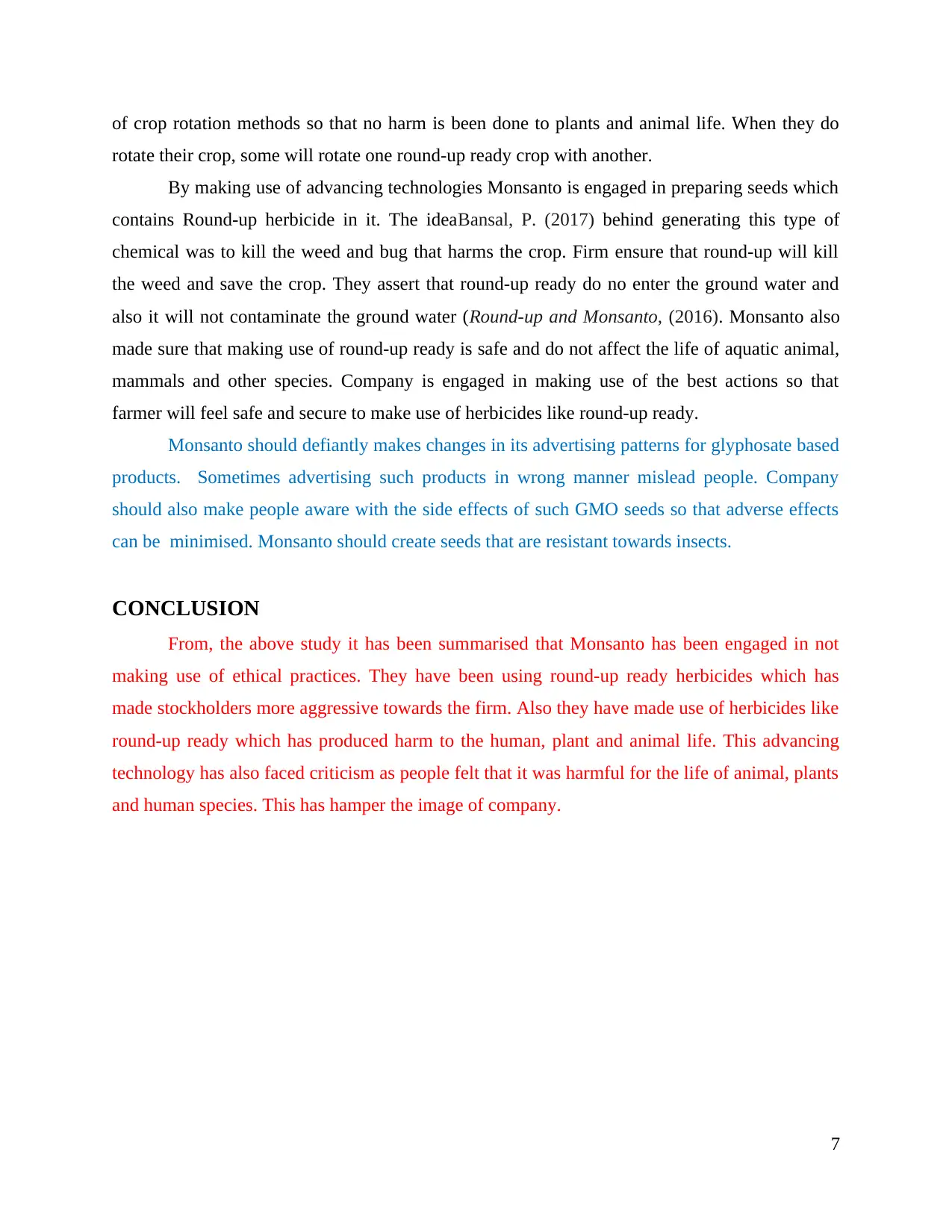
of crop rotation methods so that no harm is been done to plants and animal life. When they do
rotate their crop, some will rotate one round-up ready crop with another.
By making use of advancing technologies Monsanto is engaged in preparing seeds which
contains Round-up herbicide in it. The ideaBansal, P. (2017) behind generating this type of
chemical was to kill the weed and bug that harms the crop. Firm ensure that round-up will kill
the weed and save the crop. They assert that round-up ready do no enter the ground water and
also it will not contaminate the ground water (Round-up and Monsanto, (2016). Monsanto also
made sure that making use of round-up ready is safe and do not affect the life of aquatic animal,
mammals and other species. Company is engaged in making use of the best actions so that
farmer will feel safe and secure to make use of herbicides like round-up ready.
Monsanto should defiantly makes changes in its advertising patterns for glyphosate based
products. Sometimes advertising such products in wrong manner mislead people. Company
should also make people aware with the side effects of such GMO seeds so that adverse effects
can be minimised. Monsanto should create seeds that are resistant towards insects.
CONCLUSION
From, the above study it has been summarised that Monsanto has been engaged in not
making use of ethical practices. They have been using round-up ready herbicides which has
made stockholders more aggressive towards the firm. Also they have made use of herbicides like
round-up ready which has produced harm to the human, plant and animal life. This advancing
technology has also faced criticism as people felt that it was harmful for the life of animal, plants
and human species. This has hamper the image of company.
7
rotate their crop, some will rotate one round-up ready crop with another.
By making use of advancing technologies Monsanto is engaged in preparing seeds which
contains Round-up herbicide in it. The ideaBansal, P. (2017) behind generating this type of
chemical was to kill the weed and bug that harms the crop. Firm ensure that round-up will kill
the weed and save the crop. They assert that round-up ready do no enter the ground water and
also it will not contaminate the ground water (Round-up and Monsanto, (2016). Monsanto also
made sure that making use of round-up ready is safe and do not affect the life of aquatic animal,
mammals and other species. Company is engaged in making use of the best actions so that
farmer will feel safe and secure to make use of herbicides like round-up ready.
Monsanto should defiantly makes changes in its advertising patterns for glyphosate based
products. Sometimes advertising such products in wrong manner mislead people. Company
should also make people aware with the side effects of such GMO seeds so that adverse effects
can be minimised. Monsanto should create seeds that are resistant towards insects.
CONCLUSION
From, the above study it has been summarised that Monsanto has been engaged in not
making use of ethical practices. They have been using round-up ready herbicides which has
made stockholders more aggressive towards the firm. Also they have made use of herbicides like
round-up ready which has produced harm to the human, plant and animal life. This advancing
technology has also faced criticism as people felt that it was harmful for the life of animal, plants
and human species. This has hamper the image of company.
7
⊘ This is a preview!⊘
Do you want full access?
Subscribe today to unlock all pages.

Trusted by 1+ million students worldwide
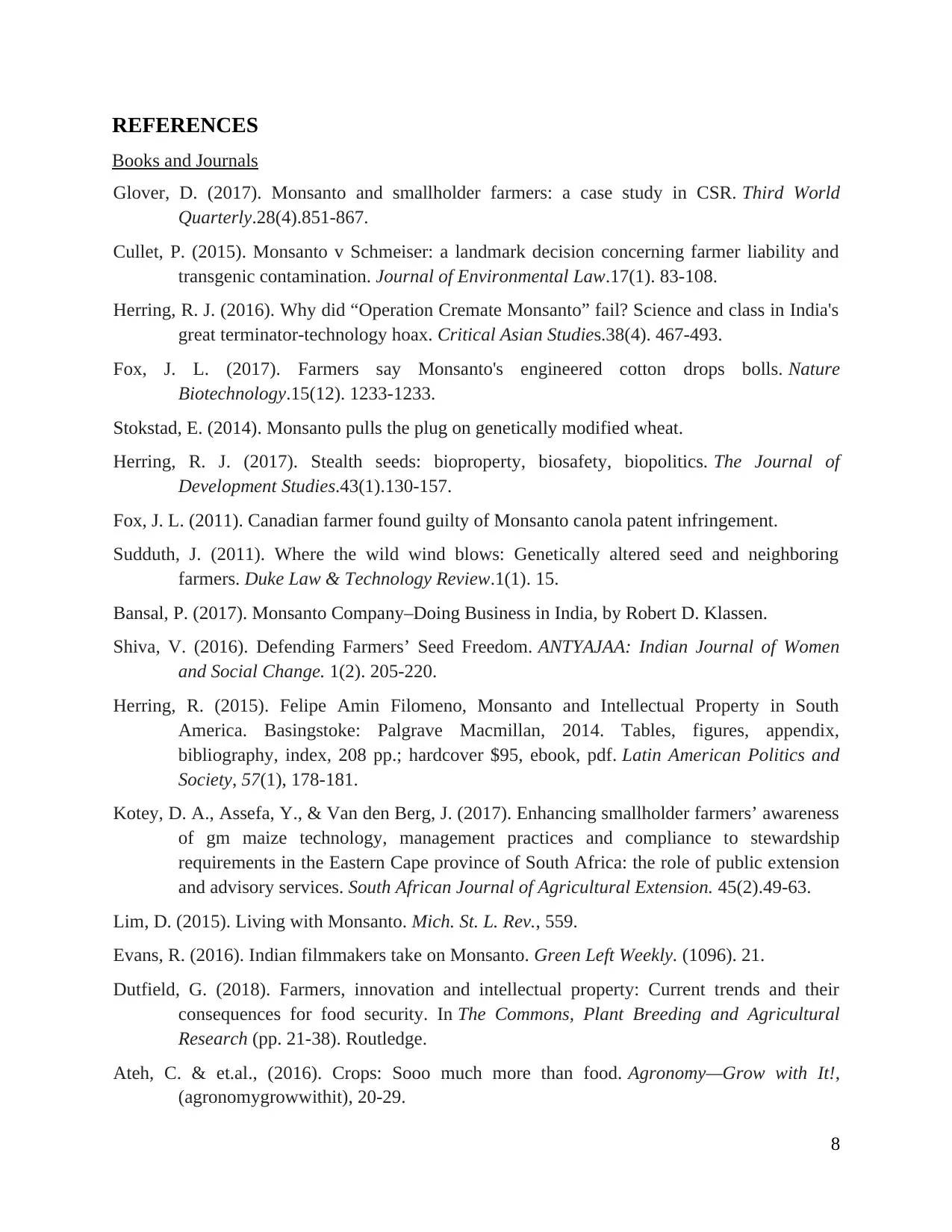
REFERENCES
Books and Journals
Glover, D. (2017). Monsanto and smallholder farmers: a case study in CSR. Third World
Quarterly.28(4).851-867.
Cullet, P. (2015). Monsanto v Schmeiser: a landmark decision concerning farmer liability and
transgenic contamination. Journal of Environmental Law.17(1). 83-108.
Herring, R. J. (2016). Why did “Operation Cremate Monsanto” fail? Science and class in India's
great terminator-technology hoax. Critical Asian Studies.38(4). 467-493.
Fox, J. L. (2017). Farmers say Monsanto's engineered cotton drops bolls. Nature
Biotechnology.15(12). 1233-1233.
Stokstad, E. (2014). Monsanto pulls the plug on genetically modified wheat.
Herring, R. J. (2017). Stealth seeds: bioproperty, biosafety, biopolitics. The Journal of
Development Studies.43(1).130-157.
Fox, J. L. (2011). Canadian farmer found guilty of Monsanto canola patent infringement.
Sudduth, J. (2011). Where the wild wind blows: Genetically altered seed and neighboring
farmers. Duke Law & Technology Review.1(1). 15.
Bansal, P. (2017). Monsanto Company–Doing Business in India, by Robert D. Klassen.
Shiva, V. (2016). Defending Farmers’ Seed Freedom. ANTYAJAA: Indian Journal of Women
and Social Change. 1(2). 205-220.
Herring, R. (2015). Felipe Amin Filomeno, Monsanto and Intellectual Property in South
America. Basingstoke: Palgrave Macmillan, 2014. Tables, figures, appendix,
bibliography, index, 208 pp.; hardcover $95, ebook, pdf. Latin American Politics and
Society, 57(1), 178-181.
Kotey, D. A., Assefa, Y., & Van den Berg, J. (2017). Enhancing smallholder farmers’ awareness
of gm maize technology, management practices and compliance to stewardship
requirements in the Eastern Cape province of South Africa: the role of public extension
and advisory services. South African Journal of Agricultural Extension. 45(2).49-63.
Lim, D. (2015). Living with Monsanto. Mich. St. L. Rev., 559.
Evans, R. (2016). Indian filmmakers take on Monsanto. Green Left Weekly. (1096). 21.
Dutfield, G. (2018). Farmers, innovation and intellectual property: Current trends and their
consequences for food security. In The Commons, Plant Breeding and Agricultural
Research (pp. 21-38). Routledge.
Ateh, C. & et.al., (2016). Crops: Sooo much more than food. Agronomy—Grow with It!,
(agronomygrowwithit), 20-29.
8
Books and Journals
Glover, D. (2017). Monsanto and smallholder farmers: a case study in CSR. Third World
Quarterly.28(4).851-867.
Cullet, P. (2015). Monsanto v Schmeiser: a landmark decision concerning farmer liability and
transgenic contamination. Journal of Environmental Law.17(1). 83-108.
Herring, R. J. (2016). Why did “Operation Cremate Monsanto” fail? Science and class in India's
great terminator-technology hoax. Critical Asian Studies.38(4). 467-493.
Fox, J. L. (2017). Farmers say Monsanto's engineered cotton drops bolls. Nature
Biotechnology.15(12). 1233-1233.
Stokstad, E. (2014). Monsanto pulls the plug on genetically modified wheat.
Herring, R. J. (2017). Stealth seeds: bioproperty, biosafety, biopolitics. The Journal of
Development Studies.43(1).130-157.
Fox, J. L. (2011). Canadian farmer found guilty of Monsanto canola patent infringement.
Sudduth, J. (2011). Where the wild wind blows: Genetically altered seed and neighboring
farmers. Duke Law & Technology Review.1(1). 15.
Bansal, P. (2017). Monsanto Company–Doing Business in India, by Robert D. Klassen.
Shiva, V. (2016). Defending Farmers’ Seed Freedom. ANTYAJAA: Indian Journal of Women
and Social Change. 1(2). 205-220.
Herring, R. (2015). Felipe Amin Filomeno, Monsanto and Intellectual Property in South
America. Basingstoke: Palgrave Macmillan, 2014. Tables, figures, appendix,
bibliography, index, 208 pp.; hardcover $95, ebook, pdf. Latin American Politics and
Society, 57(1), 178-181.
Kotey, D. A., Assefa, Y., & Van den Berg, J. (2017). Enhancing smallholder farmers’ awareness
of gm maize technology, management practices and compliance to stewardship
requirements in the Eastern Cape province of South Africa: the role of public extension
and advisory services. South African Journal of Agricultural Extension. 45(2).49-63.
Lim, D. (2015). Living with Monsanto. Mich. St. L. Rev., 559.
Evans, R. (2016). Indian filmmakers take on Monsanto. Green Left Weekly. (1096). 21.
Dutfield, G. (2018). Farmers, innovation and intellectual property: Current trends and their
consequences for food security. In The Commons, Plant Breeding and Agricultural
Research (pp. 21-38). Routledge.
Ateh, C. & et.al., (2016). Crops: Sooo much more than food. Agronomy—Grow with It!,
(agronomygrowwithit), 20-29.
8
Paraphrase This Document
Need a fresh take? Get an instant paraphrase of this document with our AI Paraphraser
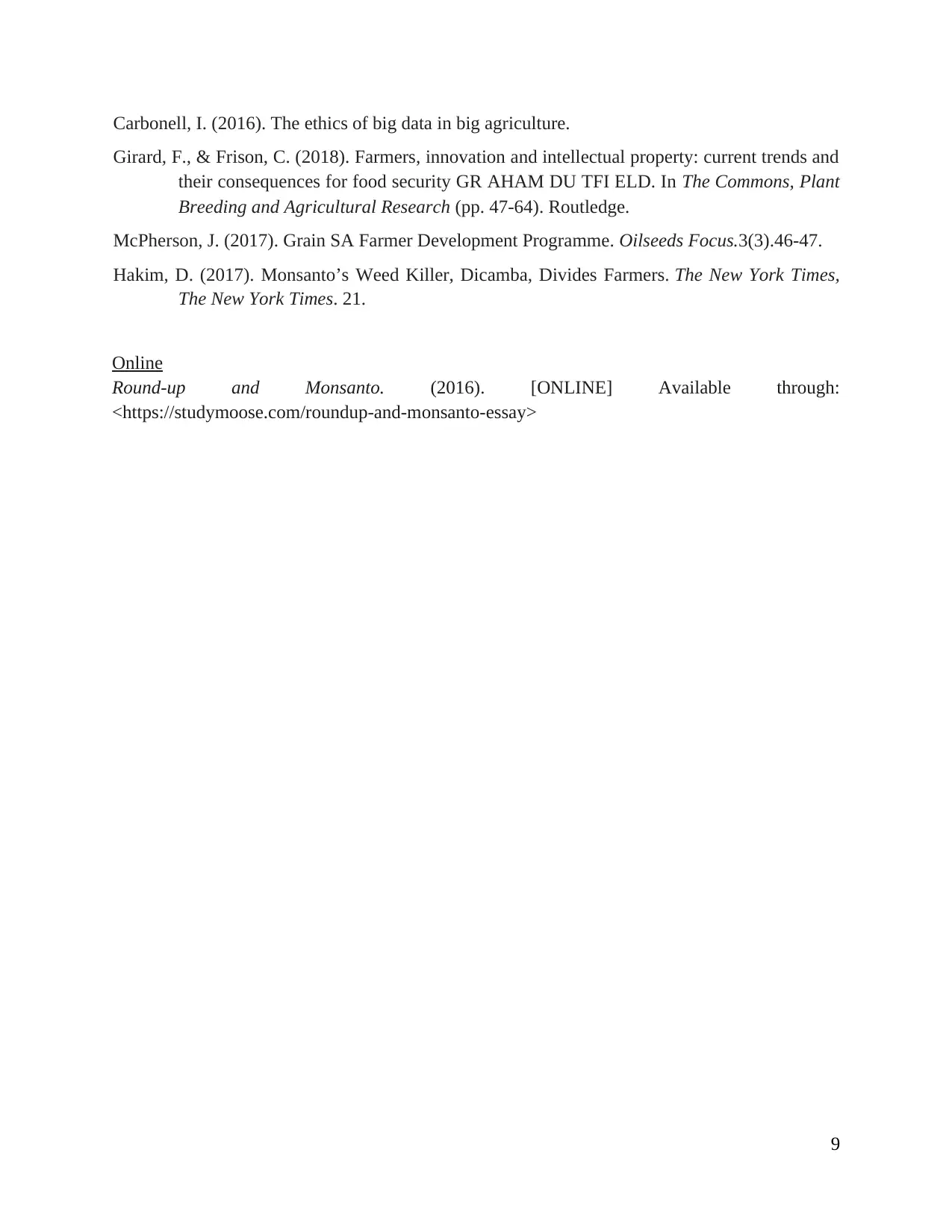
Carbonell, I. (2016). The ethics of big data in big agriculture.
Girard, F., & Frison, C. (2018). Farmers, innovation and intellectual property: current trends and
their consequences for food security GR AHAM DU TFI ELD. In The Commons, Plant
Breeding and Agricultural Research (pp. 47-64). Routledge.
McPherson, J. (2017). Grain SA Farmer Development Programme. Oilseeds Focus.3(3).46-47.
Hakim, D. (2017). Monsanto’s Weed Killer, Dicamba, Divides Farmers. The New York Times,
The New York Times. 21.
Online
Round-up and Monsanto. (2016). [ONLINE] Available through:
<https://studymoose.com/roundup-and-monsanto-essay>
9
Girard, F., & Frison, C. (2018). Farmers, innovation and intellectual property: current trends and
their consequences for food security GR AHAM DU TFI ELD. In The Commons, Plant
Breeding and Agricultural Research (pp. 47-64). Routledge.
McPherson, J. (2017). Grain SA Farmer Development Programme. Oilseeds Focus.3(3).46-47.
Hakim, D. (2017). Monsanto’s Weed Killer, Dicamba, Divides Farmers. The New York Times,
The New York Times. 21.
Online
Round-up and Monsanto. (2016). [ONLINE] Available through:
<https://studymoose.com/roundup-and-monsanto-essay>
9
1 out of 11
Your All-in-One AI-Powered Toolkit for Academic Success.
+13062052269
info@desklib.com
Available 24*7 on WhatsApp / Email
![[object Object]](/_next/static/media/star-bottom.7253800d.svg)
Unlock your academic potential
Copyright © 2020–2026 A2Z Services. All Rights Reserved. Developed and managed by ZUCOL.


